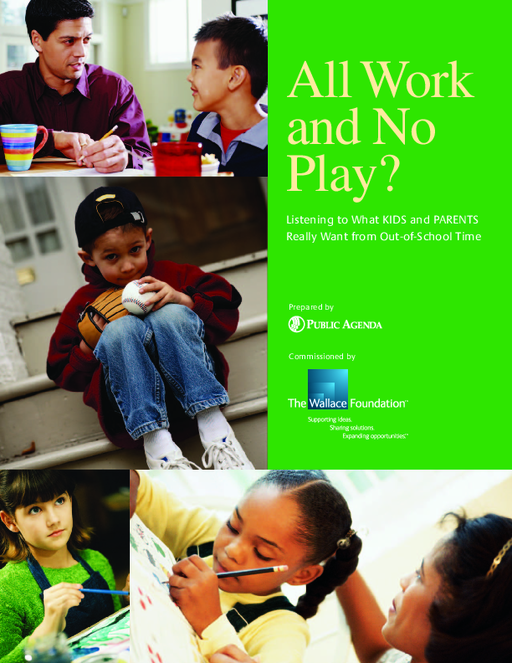Implementation Tips
What Parents Should Know
The following advice for parents has been drawn from several studies The Wallace Foundation commissioned to better understand effective afterschool programs.
Good afterschool programs have many things in common:
- They’re challenging. Adults encourage and motivate kids to achieve more than they thought they could.
- They offer a positive social environment, where both adult-youth and peer relationships are warm and friendly.
- The skill and enthusiasm of the adult leaders is evident (and can actually be more important than the subject matter of the program).
Here’s what you should look for in an afterschool program:
- A clear mission, such as teaching kids to paint or helping kids do better in school;
- Realistic expectations for what its participants will achieve;
- A safe and healthy environment;
- A supportive emotional climate;
- A good ratio of adults to children;
- Stable, well-trained personnel;
- Content and instruction that match your child’s needs and interests.
The first step for parents is to know what you want from a program. Are you primarily concerned with having a safe environment, getting homework done, learning an art form, sports, a range of activities, nearness to home, academic help? Here’s what parents said in several surveys:
- Surprisingly, perhaps, most parents in one survey weren’t looking for a program to improve their child’s performance in school. To the contrary, 41 percent wanted a program that would develop their child’s interests and hobbies; 27 percent wanted one that would keep their kids out of trouble; and 16 percent said the purpose should simply be to have fun.
- One-third of the parents in the same survey, however, said a program that provides help with homework was very important to them; another 37 percent said this would be important but not essential; and 28 percent said it was not important.
- Three-fourths of parents surveyed in New York City said they were looking to enrich their children’s education with arts and music; nearly the same number were also looking for good role models for their children. Most also want their kids to be safe and to stay out of trouble.
What does your child want? The higher your child’s interest level, the more they will participate. Here’s what kids say they want:
- Students in a Providence, R.I., survey said that what matters most to them are the fun they expect to have, whether their friends will attend and they will be able to make new friends.
- These students also wanted structured activities that reflect their genuine interests and not what adults think is appropriate. They wanted the flexibility to choose the activity they participate in each day, and they showed a preference for younger, enthusiastic leaders.
- Another study of middle school students who don’t participate in a program said they might if they could choose what they did there and if more of their friends went there. They want it to be less like school, but would like to get their homework done there.
- Nine out of 10 kids in one survey admitted that, even though they might complain about it, they sometimes needed a push from a parent to get involved.
Finally, it’s worth the time it will take to learn what programs are available and evaluate the ones that look interesting, because the benefits can be significant. Here’s what your child might gain from a good program:
- A strengthened sense of responsibility (some studies found that good programs enabled kids to handle anger better and delay the age when students started drinking alcohol);
- Greater enjoyment of school, resulting in better attendance;
- More self-confidence;
- Having more friends and getting along better with peers;
- Experience with tasks that teach responsibility for results and teamwork, such as theater productions or sports.

